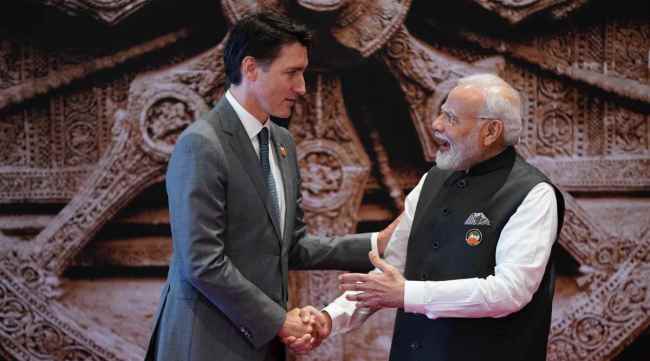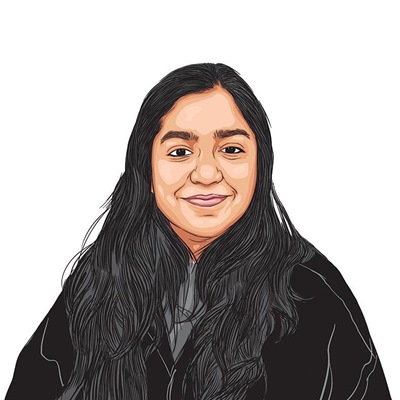Opinion View from the neighbourhood | From India-Canada row to Pakistan’s World Cup squad: What the Pakistani media is talking about
A weekly wrap-up of the issues being discussed and debated in India’s neighbourhood
 Prime Minister Narendra Modi welcomes Canada Prime Minister Justin Trudeau upon his arrival at Bharat Mandapam convention center for the G20 Summit, in New Delhi, India, Saturday, Sept. 9, 2023. (AP Photo)
Prime Minister Narendra Modi welcomes Canada Prime Minister Justin Trudeau upon his arrival at Bharat Mandapam convention center for the G20 Summit, in New Delhi, India, Saturday, Sept. 9, 2023. (AP Photo) India-Canada row
Earlier this week, Canadian Prime Minister Justin Trudeau claimed that there are “credible” reasons for the country to believe that India had a part to play in the killing of pro-Khalistan separatist leader Hardeep Singh Nijjar in June. Since then, both nations have asked ambassadors from the other country to leave and there is demand for proof.
Dawn (September 20) says, “Considering the cosy relationship between New Delhi and Tel Aviv, perhaps the Indians have taken a page out of Mossad’s handbook in organising the hit on an individual they considered a ‘terrorist’.” News International (September 20) agrees saying, “The brazenness and the impunity with which the Indian government is behaving mimics how Israel has behaved over the years.” Daily Times (September 20) says, “No side is ready to pull any punches as Ottawa does not wish to overlook an ‘unacceptable violation of (its) sovereignty’.” It also writes that “Indian authorities dramatically hype up the threat [of Khalistan]… It suits them to divert the attention of the voters away from the actual challenges…” Express Tribune (September 20) believes that this is indicative of “brewing social discord” and also that “a sizeable population of India is not on terms with what India encapsulates as secularism. So are the fissures with other minorities across India, and the tragedies of Manipur and Kashmir are cases in point.”
A historic first day for the new Chief Justice of Pakistan
Justice Qazi Faez Isa was sworn in as the 29th Chief Justice of Pakistan on September 17. His ceremony was marked by much appreciation from the media due to unconventional actions such as taking his personal vehicle to work, calling his wife to take the oath of the first female registrar of the Supreme Court beside him and then calling a full court to hear a set of petitions — the proceedings of which were broadcast live on television.
Daily Times (September 19) said, “A new era has definitely begun for the country’s top judiciary where intense public scrutiny would take note of all questions asked, logic contemplated and the expressions of all parties in the house.” The Nation (September 19) speaks to the people watching saying, “Some of these young persons… might have had the thought that they too would one day add their voice to this rich discourse and change the destiny of their country.”
World Cup ready
The 2023 ICC Men’s Cricket World Cup will be held in India from October 5 to November 19 featuring 10 teams. Pakistan announced its squad on Friday. The overall response to the team selection has been positive with the media lauding the selectors’ faith in skipper Babar Azam and his deputy Shadab Khan. A few members have been given a second chance despite their poor performance at the Asia Cup.
Express Tribune (September 23) says, “All in all, the squad looks good and can give any opponent a run for their money.” Dawn (September 24) comments on the team’s Asia Cup loss saying, “A thrashing at the hands of India and the narrow loss to Sri Lanka were the reality check the team needed.” But it ends on a hopeful note saying, “Pakistan have a history of going to tournaments with doubts… only to overcome the odds and shine their way through.”
Inclusion and exclusion of minority voters
Even as the timeline for Pakistan to go to polls remains unclear with the Election Commission and other stakeholders differing on the matter of dates, the ECP released its latest statistics on the number of voters, which increased by 21 million until July 2023. The noteworthy number here is the addition of 11.74 million women as voters, while the number of men added is 9.28 million.
News International (September 24) points out that “Despite the positive shift, much more needs to be done… Most women do not attend political gatherings out of fear of harassment and name-calling.” Moreover, “There are still areas in the country where women are actively prohibited from voting.” But this new data on more registered women voters “is a breath of fresh air in an otherwise bleak democratic picture.”
However, even as women seem to actively be participating more in political affairs and the gap between men and women seems to be lessening, The Nation (September 21) reminds us that “for the disabled, the transgender, and religious minorities, the gap persists.” But, “For a democracy to deliver to its best potential, all people should be able to cast votes. If such large segments of society are excluded from the process, it puts the legitimacy of the elected government into question.”
An economy update
On the economy front, the Pakistani Rupee seems to be standing resilient against the US Dollar. Even so, a new Asian Development Bank report for South Asia estimates Pakistan’s growth to be 1.9 per cent in comparison to India’s estimate of six to seven per cent.
On the Rupee staying firm, The Nation (September 24) says, “This surge carries a message of hope and optimism for our nation’s economy… If this trend of rupee appreciation continues, it could potentially lead to a drop in the prices of goods, fuel, and other petroleum products.” Meanwhile, Express Tribune (September 23) comments on the ADB report saying, “just getting the economy to a point where it is no longer considered a disaster will require ‘steadfast and consistent implementation of policy reforms’… Pakistan will also have to ease import controls, which would bring another wave of devaluation and foreign exchange stress, and perhaps the biggest ask, a ‘smooth general election’ to help restore confidence.”
adya.goyal@expressindia.com





